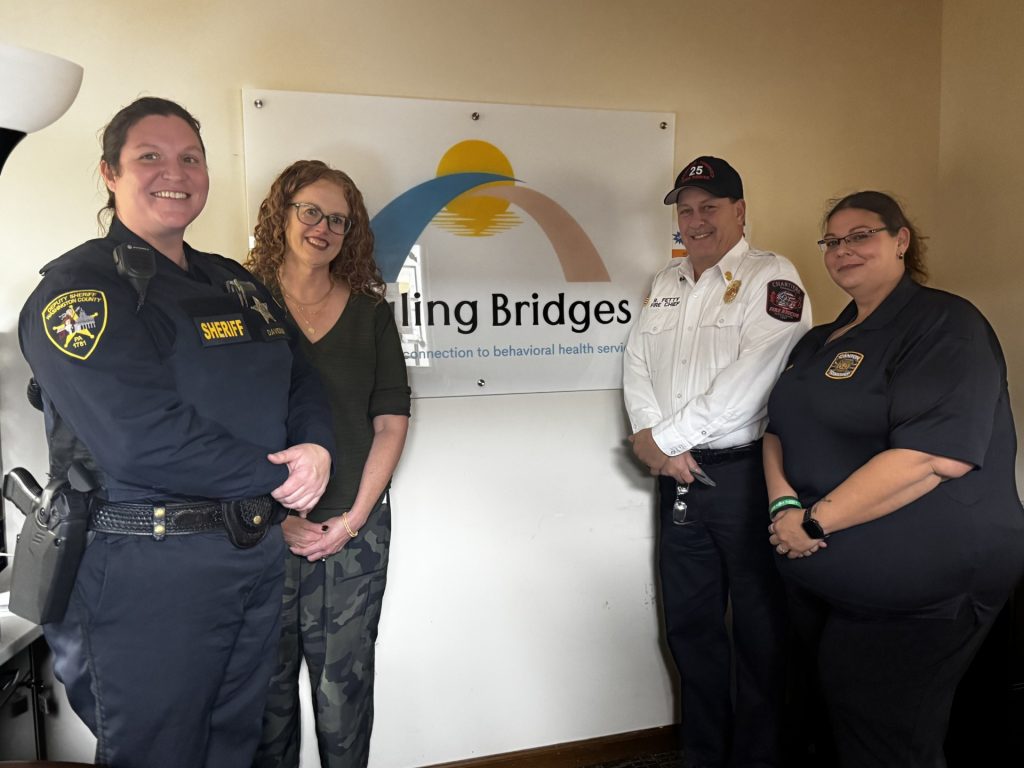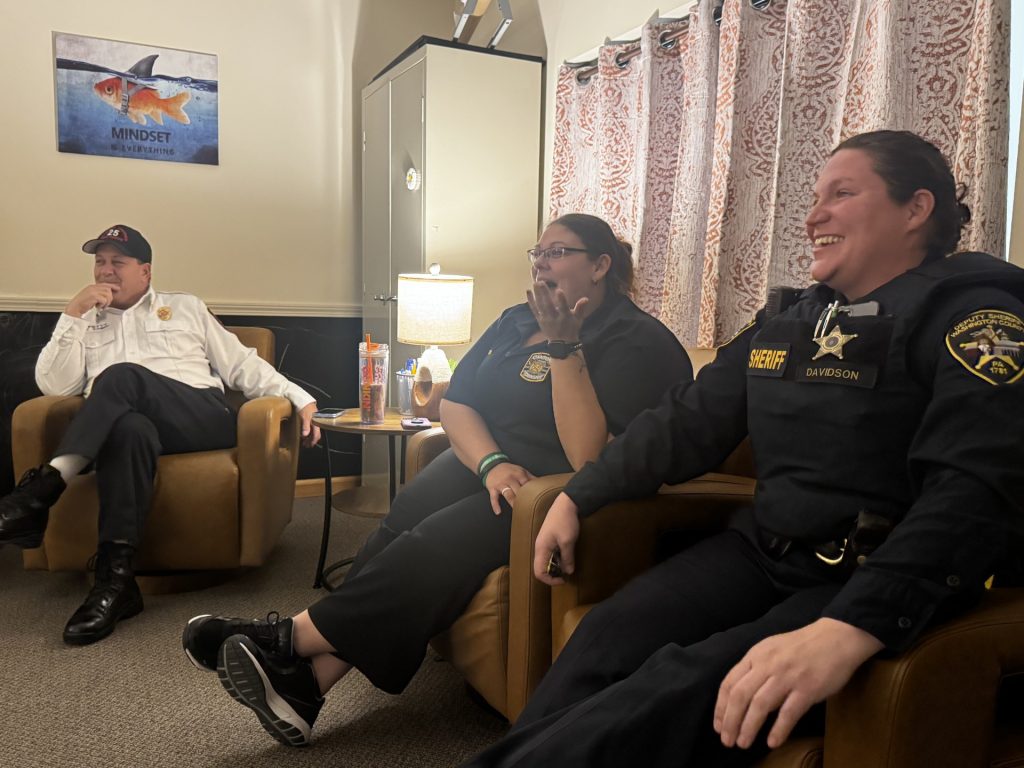Trauma on the job: Program in works to help first responders cope
A few days after a 15-year-old boy was struck and killed by a vehicle in the city of Washington while riding a dirt bike, Natalie Ross, CEO of Healing Bridges, received a phone call.
The call was from a distraught EMS worker who had responded to the April 14 accident, which happened in front of the Healing Bridges offices.
ŌĆ£The EMS worker on that call was looking to get help for the trauma from working at that incident,ŌĆØ said Ross.
That got Ross thinking. What if there was a program that helped first responders in Washington County deal with the devastating incidents they encounter on the job every day that can negatively impact their mental health?
The solution: Healing Bridges, with a team of first responders and public safety officials, formed a ŌĆ£Responders First Initiative,ŌĆØ a committee that is working to create a Critical Incident Stress Management (CISM) team for Washington County.
CISM teams are made up of volunteers that include trained peers ŌĆō active or retired first responders who have a first-hand understanding of what their fellow first responders go through ŌĆō and trained mental health professionals.
They help first responders manage and recover from the stress of their jobs through a range of interventions, including on-scene support at an incident, debriefings, peer counseling after the incident, and assessments to determine the need for additional services.
In a job where they often detach their feelings from their work in order to respond, discussing the traumas that paramedics, police, firefighters, and 911 dispatchers experience on a sometimes daily basis doesnŌĆÖt come easily, Ross said.
And whether or not those in emergency services want to talk about mental health, studies show those traumas take a toll: First responders face higher rates of depression, anxiety and burnout compared to the general population.
One in four first responders suffer from depression, 34% are at risk of suicide, 30% to 40% suffer from substance or alcohol abuse, and police and firefighters are more likely to die by suicide than die in the line of duty.
ŌĆ£We put on emotional armor,ŌĆØ said Deputy Elizabeth Davidson of the Washington County SheriffŌĆÖs Office, who is part of the Responders First Initiative. ŌĆ£You have to do that when youŌĆÖre walking into a house and thereŌĆÖs domestic violence, or you have to do that when thereŌĆÖs a fire, or when thereŌĆÖs an accident with children involved. And that emotional armor just becomes very difficult to take off. So ŌĆśIŌĆÖm fineŌĆÖ oftentimes becomes a statement that is used all the time, even when youŌĆÖre not. And so we think we have to be tough all the time, and to show any kind of weakness is taboo. But this job is hard, and I think that having places to say ŌĆśItŌĆÖs OK not to be OKŌĆÖ and we can talk about those things is important.ŌĆØ
The CISM program helps first responders break the stigma surrounding mental health by pushing back on the notion that asking for help is a sign of weakness.
Chartiers Township Fire Chief Rob Fetty, a longtime firefighter and a church pastor, encourages firefighters to talk about job-related stress and trauma.
ŌĆ£ItŌĆÖs a vicious culture where, for so many years, weŌĆÖve been told, ŌĆśSuck it up kid, youŌĆÖll be OK,ŌĆÖ but we canŌĆÖt continue to live on the edge and not deal with things. And I tell my firefighters to go to counseling,ŌĆØ said Fetty.
Fetty was hit particularly hard by the death of a 3-month-old two years ago, and has since sought counseling.
ŌĆ£IŌĆÖm not ashamed to tell my guys and women that IŌĆÖm going to counseling. If I canŌĆÖt help myself, how can I help them? We can either get the help we need, or we suffer.ŌĆØ
At an October training and outreach event hosted by Healing Bridges and the Washington County Department of Public Safety, nearly three dozen first responders turned out.
Dr. Sheila Roth, a Washington County native and a social worker who counsels first responders, and Deputy State Fire Commissioner J.C. Tedorski spoke with first responders about the challenges of their jobs.
ŌĆ£(CISM programs) are so important because first responders encounter frequent trauma, both emotional and physical,ŌĆØ said Roth in a phone interview. ŌĆ£They work very hard, and when youŌĆÖre in a smaller department itŌĆÖs all hands on deck and you get a lot more cumulative trauma. My hope is that they can continue to do the good work that they do and that they can get the support they need to not let this type of job make them have emotional and physical difficulties down the road.ŌĆØ
The Responders First Initiative team is seeking grant funding and/or other funding for the programŌĆÖs initial $170,000 costs, along with additional continued training expenses.
Sheila Renz serves as the public relations manager for Canton TownshipŌĆÖs emergency management and is a member of the Responders First Initiative.
ŌĆ£When I was approached about CISM, I said absolutely yes, letŌĆÖs do this,ŌĆØ said Renz. ŌĆ£If we donŌĆÖt put our responders first, there wonŌĆÖt be any responders left. TheyŌĆÖre successfully suiciding, theyŌĆÖre turning to addictions to try to calm themselves, there are volunteer firefighters who are quitting their other jobs. These are people who go into community service because they want to help others. TheyŌĆÖre doing the crazy things that nobody else wants to do ŌĆō theyŌĆÖre running into the burning building, theyŌĆÖre responding to the domestic violence calls and theyŌĆÖre seeing horrors that we donŌĆÖt want to see but we donŌĆÖt want them to talk about either. They are so very affected.ŌĆØ
Fetty has been on the receiving end of the support a CISM program provides ŌĆō an Allegheny County CISM team responded following the infantŌĆÖs death ŌĆō and believes that a CISM program will make it more likely that first responders seek help and take better care of their mental health.
Fetty said that while he has been around death and accidents hundreds of times in his years in firefighting, it takes a toll. He has been shaken by the recent passing of a woman who choked to death, and while off-duty he helped provide aid to a youth who was stabbed at a football game at Ringgold High School.
ŌĆ£That broke me, ŌĆØ said Fetty. ŌĆ£I feel this is a calling, we do this because we want to do it. But if youŌĆÖre getting burned out and getting PTSD and other things, itŌĆÖs not sustainable.ŌĆØ
Davidson said the CISM program can help those affected deal with an immediate situation and then get additional help they need from professionals.
ŌĆ£The weight of our jobs can be crushing,ŌĆØ said Davidson. ŌĆ£What we want to do is find a way for first responders to get through this and make it less heavy.ŌĆØ



